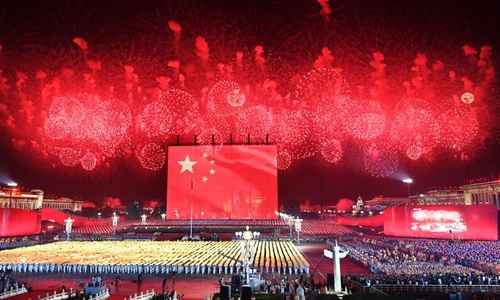The world is undergoing profound changes unseen in a century. Uncertainty lingers globally. Small countries have no alternative but to go with the tide. Major powers have relatively more options, but they can also easily become the focus of overlapping interests and contradictions.

A grand evening gala is staged on Tian'anmen Square to celebrate the 70th anniversary of the founding of the People's Republic of China on October 1. (Photo: Xinhua/Yin Bogu)
In the past year, China has gone through the continuous impact of the trade war and the sudden outbreak of radical protests in Hong Kong, which was triggered by an extradition amendment bill. American and West's attacks on China's governance over the Xinjiang Uygur Autonomous Region have peaked. In the face of continuing challenges, China has no strategic tool to win with one move. To be honest, China seemed a bit passive.
Yet, looking back, the country has shown strong strategic willpower in the passive position. It can always avoid the worst-case scenario, maintain general stability amid impacts, gradually control and reduce losses, and accumulate momentum to reverse the tide, forming a strategic stability and an overall trend toward a favorable future.
The trade war has greatly reshaped China-US ties. China embraced the change with a realistic attitude. It has firmly stuck to its principles while having the courage to resolutely fight back against US pressure. Beijing has patiently negotiated and contended with Washington, leaving time and room for bottom lines of both sides to play their role.
Before the news that China and the US reached a consensus on the phase one trade agreement, China's confidence to move forward amid the trade war had already been much higher than the anxiety over the possibility that comprehensive US pressure could seriously hinder China's rejuvenation.
The chaos in Hong Kong is far from over. But the destructive power in the city has already been exhausted, without being able to hit China as certain forces had hoped. The country has been supporting the Hong Kong Special Administrative Region (SAR) to mobilize its own resources to turn things around. The current situation is not yet ideal, but China has shaped abundant adaptability. The confidence of the Hong Kong SAR's patriotic forces is returning. Radical opposition powers are getting tired. Overseas forces are running out of tactics to stir up more trouble. All this is quietly changing Hong Kong's current situation and its future.
On Xinjiang, China holds the key to continuously improve the situation in the region, using the facts to confront outright lies from the outside world. As Xinjiang's order and economic and social development improves, religious conflicts and extreme events in other parts of the world are rising. The initiative in this war of words will gradually be returned to the hands of the Chinese people.
Attacks against China in all directions and in various ways have failed. That's because all of them are based on lies or wrong judgment.
China is not the most powerful country. But it is strong enough to defend its philosophy of seeking truth from facts. Sometimes, justice and correctness need to be proven through games and tested by time. China has the ability to create conditions for that. This is perhaps what strategic willpower means.


